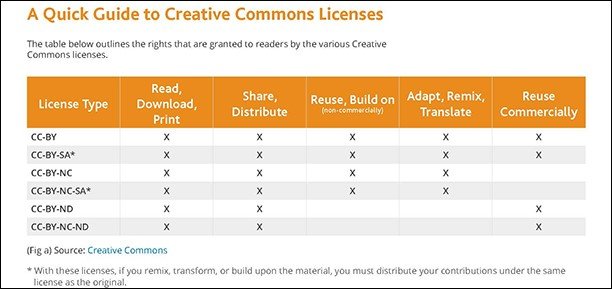With authors increasingly being required by funders to publish the resulting research in open access publications, a clear understanding of the Creative Commons (CC) licenses used by open access journals is key.
Created by Creative Commons, a non-profit organization, each of the six CC licenses grant readers specific rights regarding how the open access research can—and can’t—be used. Adding to the need for understanding is the fact that some funders mandate that the research they fund be published under specific CC licenses. Choosing the CC license under which your research is published is one of the more important decisions an author can make during the publication process.
Below is a summary of the rights granted by each of the CC licenses. The list is sorted from the most permissive license to the most restrictive license.
CC BY: The most permissive CC license. This license lets others distribute, remix, adapt, and build upon your work, even commercially, as long as they credit you for the original work.
CC BY-SA: This license lets others distribute, remix, adapt, and build upon your work even for commercial purposes, as long as they credit you and license their new creations under the identical terms.
CC BY-NC: This license lets others distribute, remix, adapt, and build upon your work. Their new works must acknowledge you and be non-commercial, but they don’t have to license their derivative work on the same terms.
CC BY-NC-SA: With this license, readers can distribute, remix, adapt, and build upon your work non-commercially, as long as they credit you and license their new creations under the identical terms.
CC BY-ND: This license allows others to copy and distribute your work—commercially and non-commercially—as long as it is passed along unchanged and in whole, with credit to you.
CC BY-NC-ND: The most restrictive CC license. This license allows others to copy and distribute your work and share them with others as long as they credit you, but they can’t change the work in any way or use it commercially.
Source: creativecommons.org
Reprinted from Choosing an Open Access Journal: A Guide for Authors, available for free download from Wolters Kluwer
Two final points for authors to remember:
- The CC license you apply to your work cannot be revoked—so, choose carefully!
- You must own or control the copyright for the work—only the copyright holder can apply a CC license to a copyrighted work
Further reading
creativecommons.org/licenses
Understanding Creative Commons
Copyright, Creative Commons, and Confusion
Frequently Asked Questions About Open Access





